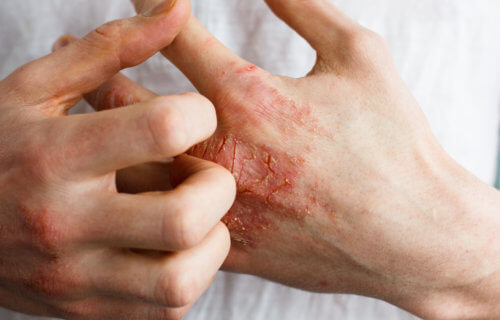DALLAS, Texas — Skin conditions can be a symptom of many factors, from poor diet to poor hygiene. Now, a new study reveals that one common inflammatory skin condition may actually have a link to your sex hormones. A team from UT Southwestern says atopic dermatitis, a form of eczema, may be the result of poorly regulated hormone production.
Atopic dermatitis (AD) affects up to 13 percent of children and one in 10 adults. It’s not just a common problem, but an expensive problem too. Study authors add that Americans spends roughly $5.3 billion on treating eczema each year.
“We often think of eczema as a dry-skin condition and treat mild cases with moisturizers,” explains corresponding author Tamia Harris-Tryon, M.D., Ph.D., Assistant Professor of Dermatology and Immunology at UTSW, in a university release. “Here, we’re showing that a gene that’s important for making sex hormones seems to play a role in the skin making its own moisturizers. If we could alter this gene’s activity, we could potentially provide relief to eczema patients by helping the skin make more oils and lipids to moisturize itself.”
What’s going on in your genes could lead to skin problems
Dr. Harris-Tryon says previous studies have found a link between AD and the overactivity in genes which control the production of two inflammatory immune molecules — interleukins 4 and 13 (IL-4 and IL-13). There has been a way to treat this however, as the drug dupilumab does a good job of reducing this inflammation in people with moderate to severe AD.
Despite knowing what molecules contribute to eczema, scientists say it’s been unclear how IL-4 and IL-13 trigger skin problems. To answer this question, Harris-Tryon’s team looked at sebocytes, cells which make up the sebaceous glands. These particular glands make an oily, waxy barrier which coats your skin and helps it retain moisture.
In lab experiments, researchers discovered that exposing sebocytes to IL-4 and IL-13 leads to changes in these cells at the genetic level. They found that a gene called HSD3B1, which makes an enzyme called 3b-hydroxysteroid dehydrogenase 1, becomes 60 times more active after exposure to IL-4 and IL-13.
The results came as a surprise to Dr. Harris-Tryon, who says this enzyme plays a key role in producing sex hormones like testosterone and progesterone. However, scientists have never linked the enzyme to dermatitis, eczema, or the production of skin lipid (or fats).
Moreover, a study of human gene activity shows that HSD3B1 was typically overactive in patients dealing with eczema. Additionally, a review of dupilumab also shows that it lowers the activity of HSD3B1. With all of this data in hand, researchers say there’s mounting evidence that IL-4 and IL-13 have a link to this sex hormone gene.
“Changing the output of this gene could eventually offer a way to treat AD that’s completely different from any treatment that currently exists,” Dr. Harris-Tryon concludes.
The findings appear in the journal Proceedings of the National Academy of Sciences (PNAS).
